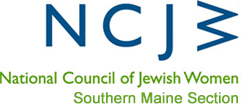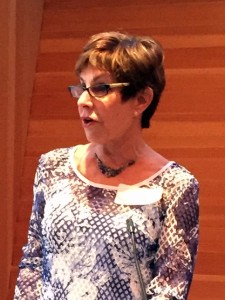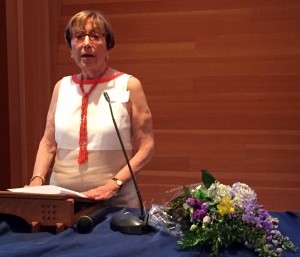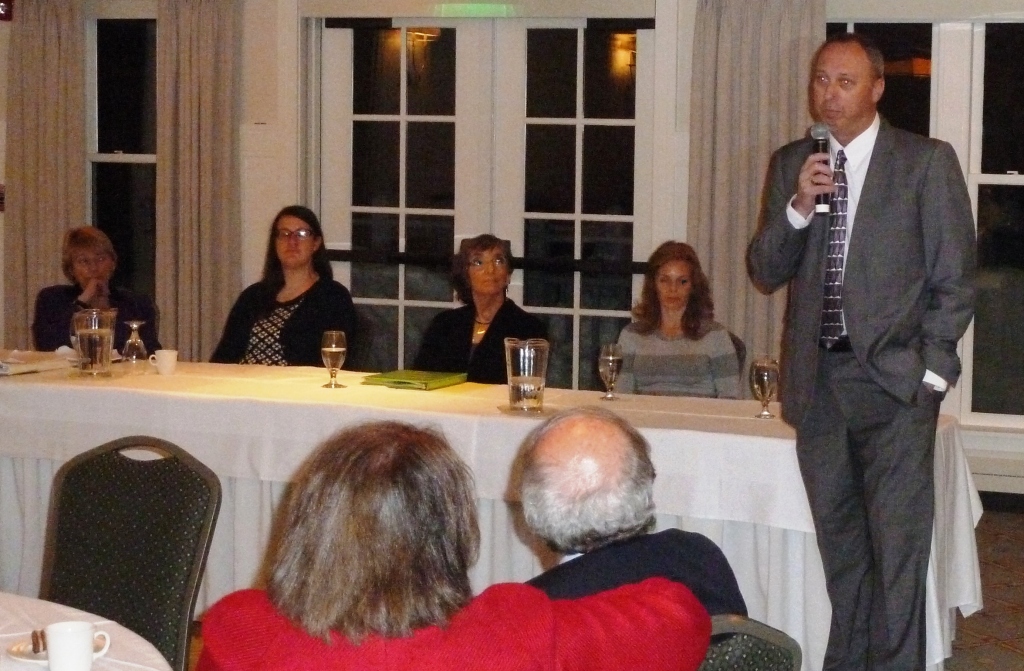The annual meeting of NCJW Southern Maine Section drew a capacity crowd to Bet Ha’am’s soaring social hall on June 10, 2015. Christy Altman’s party planning savvy was on display with a tasty spread of snacks and drinks, and colorful flowers popping against elegant black linens on the tables.
President Lynn Goldfarb encouraged the 80 plus attendees to take their seats before Immediate Past Co-President Ginny Squires-Eklund delivered the moving invocation. Lynn’s President’s Report detailed the accomplishments of the past year, and some plans for the future.
Scholarship Chair Barbara Peisner awarded scholarships to 19 area students attending college in the fall. Honorary Vice President Rosalyn Bernstein assisted in handing out three Sarah Bernstein scholarships. Two special scholarships were awarded this year in memory of Myer Marcus, who left a generous bequest to augment the Frances Marcus Scholarship Fund.
Steve Gleit took great pleasure in announcing a new scholarship fund set up by his daughter, Naomi Gleit, Facebook’s Vice President of Product Management. The Selma Gleit Memorial Scholarship for Women in STEM honors Steve’s mother, Naomi’s grandmother. It is designed to encourage young women to study Science, Technology, Engineering and Math, fields in which women are underrepresented. Dana Robbins helped hand out inaugural Gleit STEM Scholarships to two students.
In total, our Section is helping 20 scholars defray the costs of a higher education.
Honorary Vice President Gail Volk gave a brief look back at Section activities in the 1920s soon after our founding. She read excerpts from our archives, which have found a home in the Sampson Center for Diversity in Maine, part of the Special Collections at the University of Southern Maine Libraries. Our papers will be conserved and available to scholars while we retain title to all content. Members are encouraged to search their homes for any NCJW material that can be added to the archive.
Gail installed Officers and Board members to conclude the meeting. The skies were still light as we headed home.
Welcome to the annual meeting of our NCJW Southern Maine Section. Welcome to the scholars and their families who have supported them in their academic and extra curriculum achievements. Welcome members. It is the strength of our membership for over 90 years that allows us to present so many scholarships in these days of steeply rising costs for post high school education.
Thank you Past Co-President Ginny Squires-Eklund for delivering that moving Invocation.
It has been my privilege and pleasure to serve as your President this year. Our section has had an unusually successful year, thanks to the hard work of our energetic and supportive Board and you, our members. We have achieved all of the goals I outlined in my acceptance speech last year.
We revised our by-laws to fit within National’s guidelines, as well as meeting the requirements of our bank. This allowed us to update who was able to sign checks and reinvest CD’s as they renewed following the untimely death of our late Treasurer, Jackie Maidman. Additionally we are spending time at each Board meeting reviewing our budget to enable all the members to understand the need for income in order to underwrite our ongoing and new community service projects.
We established an investment advisory committee to oversee the management of our significant endowment funds which have been specifically allocated by their donors for our scholarship program.
The Board initiated a new service project directed towards food insecurity — which is defined as people not knowing where their next meal is coming from. Maine is unfortunately the least food secure state in New England as well as one of the more food insecure states in the country. We offered two programs on this issue for the community — one co-sponsored by NCJW and Temple Beth El, and the other in partnership with Lift 360, formerly the Institute for Civic Leadership.
Thanks to the donation of significant pro bono time by the Vreeland Agency and through the considerable efforts of Marcy Black, we moved into the 21st Century with the development of our Section’s website. Marcy has continued to update our website diligently, but would really like a member to volunteer to be our webmistress in the coming year.
We added several new members, as well as two new life members.
Our section held a panel discussion which was open to the public on the issue of human trafficking in Maine. This issue is National’s priority issue for the current triennial.
We continued our program of delivering backpacks loaded with school supplies to all kindergarteners in three Portland public schools, and we responded to a request that we supply members to read with children at Reiche School and to assist in math class.
Lastly, we continue to support the Family Crisis Program by supplying toiletries and underwear for each new resident at the Portland Shelter.
Occasionally things happen serendipitously. Many of you may have seen the articles in the Press Herald this winter telling the story of House Island in Casco Bay. When the United States government closed Ellis Island and Boston to immigrants, House Island became a place of disembarkation. A Portland native, Jo Israelson, who is an installation artist and lives “away,” contacted NCJW when she learned that in its very first year in 1922, our NCJW Section supplied Kosher meals to those Jews who were detained on House Island. Jo examined our archives and our Section will be featured in her exhibition “Welcoming the Stranger,” which opens at the Maine Jewish Museum on September 3rd. We will be sponsoring the opening.
But that is not all; Jo connected us with Susie R. Bock, Head of Special Collections and Director of the Sampson Center for Diversity in Maine at the University of Southern Maine Libraries. The Board voted to have all of NCJW’s extensive records dating back to 1922 permanently archived at the Sampson Center. This means all our materials will be correctly preserved for the use of students, faculty and researchers, while our Section retains title to all the material. Our section will bear none of the cost for this service and may continue to add to the archive. Therefore, I ask all of you who have been active over the years to please search your basement and attics for any NCJW material which you may have. If you let me know you have something, we will pick it up and deliver it to the Library.
As you can see, it has been a busy and exciting year.
What are our goals for the year ahead?
To increase our membership by 20 percent, particularly with an aim to gaining younger members who will be involved with our current projects and assist in finding new activities for our Section. Think how powerful we would be if each member brought in one new member. I challenge each of you to do so.
To ensure continuity of leadership in future years.
To find members to fill the following positions: Fundraising, Webmistress, Programming and a chair for the Food Insecurity Committee.
To find a fundraiser which will support our many programs and be replicable in future years.
To explore whether our Section should establish an Endowment Fund dedicated to supporting our Section’s operating Budget.
Now it is my pleasure to welcome, Scholarship Chair Barbara Peisner to present our students with their Scholarships. We are proud to congratulate each of you on your achievements and on your potential.
President Lynn Goldfarb
June 10, 2015
The state legislature’s Joint Standing Committee on Labor, Commerce, Research and Economic Development is considering several different proposals to raise Maine’s minimum wage. A living wage in Maine is at least $15.00 an hour for a single adult. The current minimum wage is $7.50. That gap explains why so many people can not feed their families.
Below is a suggested letter that you can send to members of the committee. Feel free to customize it as you wish, perhaps mentioning if you are a small business owner, or a low wage earner. Be sure to insert your town, and sign the letter with your name, address, phone and email.
Here are the addresses of all the committee members who use email. Just copy the list and paste into the “To” line of your email.
amy.volk@legislature.maine.gov; andre@andrecushing.com; senjohnpatrick14@gmail.com; Erin.Herbig@legislature.maine.gov; Paul.Gilbert@legislature.maine.gov; Anne-Marie.Mastraccio@legislature.maine.gov; Dillon.Bates@legislature.maine.gov; Ryan.Fecteau@legislature.maine.gov; Lawrence.Lockman@legislature.maine.gov; Sue.Austin@legislature.maine.gov; Joel.Stetkis@legislature.maine.gov; Karl.Ward@legislature.maine.gov
For the “Subject” line: Raise Maine’s Minimum Wage to a Living Wage
Copy and paste your letter into the email, and hit “Send.” Easy! Please CC marcyb@maine.rr.com when you send your emails so we can keep track of our advocacy efforts. The more we reach out, the more attention we’ll get for our cause.
Dear Member of the Labor Committee,
As a (town) resident and voter, as well as a member of the Southern Maine Section of the National Council of Jewish Women (NCJW), I urge you to consider significantly increasing the minimum wage in Maine to a living wage — $15.00 an hour according to a November report from the Alliance for a Just Society. Increasing the minimum wage to a living wage will allow those who currently work for minimum wage and those looking for work to become self-sufficient and to feed their families without resorting to SNAP benefits or food pantries. It is disgraceful that the U.S. Department of Agriculture in 2013 ranked Maine fifth in the proportion of residents reporting very low food security, with more than seven percent of our population unsure of where their next meal is coming from. We can do better by our neighbors.
Here are three myths about raising the federal minimum wage posted by the U.S. Department of Labor, which are applicable to our state, as well.
1. Myth: Raising the minimum wage reduces employment; people will loose their jobs.
False. A review of 64 studies on minimum wage increases found no discernible effect on employment. Additionally, more than 600 economists, seven of them Nobel Prize winners in economics, have signed a letter in support of raising the minimum wage, finding, “the weight of evidence now showing that increases in the minimum wage have had little or no negative effect on the employment of minimum wage workers, even during times of weakness in the labor market.”
2. Myth: Only part-time workers and teenagers are paid the minimum wage.
False. The typical minimum wage worker is not a high-school student earning weekend pocket money. Fifty-three percent of all minimum wage earners are full-time workers. In fact, 88 percent of those who would benefit from a federal minimum wage increase are age 20 or older, and 55 percent are women.
3. Myth: Increasing the minimum wage is bad for businesses.
False: Academic research has shown that higher wages sharply reduce employee turnover, which can reduce employment and training costs. A June, 2014, survey found that more than three out of five small business owners support increasing the minimum wage because it would increase consumer purchasing power and help the economy.
Please enact a substantial increase in Maine’s minimum wage.
Sincerely,
Your name
Address
Phone number
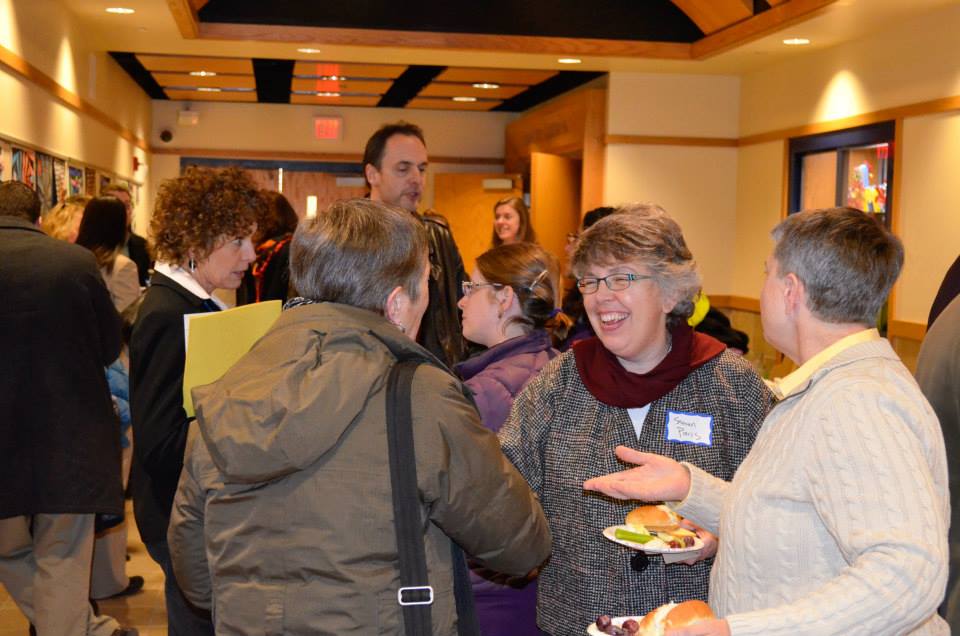 It’s impossible to see “A Place at the Table” without being outraged at the state of hunger in America.
It’s impossible to see “A Place at the Table” without being outraged at the state of hunger in America.
Our section partnered with a Lift360 Leadership Intensive group and other organizations to present “A Community Conversation: Promoting Nutrition and Reducing Hunger” March 19, 2015. The one and a-half hour documentary was the highlight of the event, which drew 50-60 people, many leaders in the non-profit community. Corporate sponsor Hannaford provided snacks. NCJW provided publicity and helped line up “Catching Health” blogger Diane Atwood to moderate a panel discussion.
The film makes a powerful argument that food policy must change to reverse the growth of hunger in America. It dispenses with the myth that the hungry are lazy, and addresses food insecurity in both urban and rural communities.
After the screening, a panel of Shannon Coffin from Good Shepherd Food Bank, Hannaford’s Julie Greene, Michelle Lamm from Preble Street’s Maine Hunger Initiative, and Barbara Nichols of the Westbrook School Department emphasized the importance of putting pressure on both state and federal legislators by writing them. They also said the most effective way to get legislators to listen would be to bring SNAP (food stamp) and food pantry users to the statehouse. The film drove home the dilemma of parents who obtain a minimum wage job only to loose their SNAP benefits, leaving the employee and his or her kids without enough funds to buy food.
Other sponsors of the event included the Westbrook Community Center, which provided the venue, Good Shepherd Food Bank, and Preble Street. The event was part of our section’s year-long focus on food insecurity in Maine. We feel it is a disgrace that people don’t have enough nourishing food in our state, home to award-winning restaurants and a thriving locavore movement.
The tables were full at a forum on human trafficking sponsored January 29, 2015, by the NCJW Southern Maine Section at the Portland Country Club. About 50 women and men grabbed cookies and coffee then settled down to hear what our panel of experts had to say. New NCJW member Shelley Grant served as the lively moderator. First, Maine Attorney General Janet Mills discussed how law enforcement has changed its attitude toward the not really “victimless” crime of prostitution, where most sex workers start out as abused children. State Senator Amy Volk (R-Buxton, Gorham, Scarborough) talked about her successful effort to get the legislature to pass and the governor to sign anti-trafficking legislation. The colorful Detective Sergeant Steve Webster of the South Portland Police Department spoke about his efforts to help desperate women escape from “the life.” And Julia Davidson of Sexual Assault Response Services of Southern Maine detailed the need for shelters and mentors for women who have no home and few social skills. National is making the fight against human trafficking one of its top priorities for the next three years. We hope to call attention to the need in Maine.
What Can I Do?
January’s presentation on human trafficking showed us how vulnerable children wind up involuntarily exploited in the sex trade. Our expert panelists told how they are fighting human trafficking in the legislature, the courts, and on the streets. Here are some ways that you, as an individual, can support the fight against human trafficking. These are not NCJW-sponsored programs, but they align with our goals.
1. Provide furnishings for Maine’s first safe house for survivors of human trafficking. Here’s a list of items needed for the shelter that Saint Andre Home is opening in May. They will accept money, department store gift cards, items from their registry at Bed, Bath & Beyond, or new appliances and mattresses.
2. Donate to a fund to meet emergency needs of trafficking victims. The Stop Fund was set up by South Portland Police Detective Sergeant Steve Webster, who is on the front lines of the battle to stop human trafficking.
Stop Fund
c/o Portland Police Federal Credit Union
109 Middle Street
Portland ME 04101
3. Assist agencies affiliated with the Maine Coalition Against Sexual Assault (MECASA). Julia Davidson, SART Program Manager for Sexual Assault Response Services of Southern Maine, suggests entering your skills and interests in the Maine Sex Trafficking & Exploitation Network (STEN) volunteer database, which matches volunteers to agencies that need help. Mentoring, photocopying, tattooing (!)– we all have skills which could serve this worthy cause.
Read more about the extent of human trafficking in Kansas City and across the country.
It was a cold January night, but Christy Altman prepared a warm welcome at her home for a half-dozen women interested in learning more about National Council of Jewish Women Southern Maine Section. Jodi Freedman, our new membership chair, co-hosted the event for new and prospective members, which a half-dozen board members also attended. Christy demonstrated her party planning skills by setting a lavish table with hors d’oeuvres and wine. Hot soup simmered in a pot for those looking to warm their bellies. After we all got acquainted, president Lynn Goldfarb outlined the section’s history and plans for the new year. Prospectives talked about their interests, and some mentioned checking out our new website before coming. We look forward to seeing some new faces at upcoming NCJW events!
What a delicious spread!
The 113th Congress closed after confirming 132 district and circuit court judges, the largest number since 1980. It’s a huge win for the American people, who are ill-served by the backlog of cases languishing in the courts. Our own Public Affairs Chair, Patty Weber, has represented NCJW in the Courts Matter to ME coalition, which has brought the issue of judicial vacancies to the forefront. We all benefit when lawmakers do their jobs, set aside partisan bickering, and vote “yes” or “no” on nominees. Thanks, Patty, for leading the way toward progress in this cause.
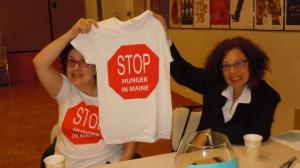 Thanks to everyone who attended “When Chicken Soup Isn’t Enough,” the kickoff of our year-long campaign to combat food insecurity in Maine. Christy Altman set up the baskets on each table which contained food for a day for a family of four on a SNAP (food stamp) budget. Dana Robbins and Sara Schwartz helped pass out STOP Hunger in Maine T-shirts. Section President Lynn Goldfarb introduced our speaker, Amy Reagan Gallant, Preble Street Maine Hunger Initiative and Advocacy Coordinator, who provided an informative and passionate presentation about the need in Maine. You’ll be hearing more about our efforts to address food insecurity in Maine, and how you can help by sending emails to state legislators and officials. If you missed the event Oct. 19, 2014, catch a video of it that ran on the Channel 8 News that Sunday night.
Thanks to everyone who attended “When Chicken Soup Isn’t Enough,” the kickoff of our year-long campaign to combat food insecurity in Maine. Christy Altman set up the baskets on each table which contained food for a day for a family of four on a SNAP (food stamp) budget. Dana Robbins and Sara Schwartz helped pass out STOP Hunger in Maine T-shirts. Section President Lynn Goldfarb introduced our speaker, Amy Reagan Gallant, Preble Street Maine Hunger Initiative and Advocacy Coordinator, who provided an informative and passionate presentation about the need in Maine. You’ll be hearing more about our efforts to address food insecurity in Maine, and how you can help by sending emails to state legislators and officials. If you missed the event Oct. 19, 2014, catch a video of it that ran on the Channel 8 News that Sunday night.
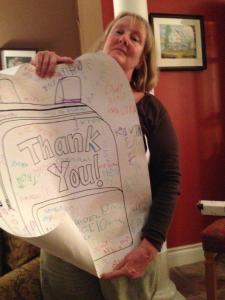
Ginny Squires-Eklund with the Reiche Thank You poster.
The Board would like to share with you the thanks we received from Reiche School for distributing backpacks full of school supplies to kindergarten students in early September. The children all signed a big poster of a backpack, which was unveiled at our latest board meeting. And our Section was singled out for thanks in the Reiche School newsletter, the Reiche Report. You can read it here on the third page. The good we do is appreciated!
In just a couple of months, Eydie Pryzant has taken a suggestion made at Reiche School when we were handing out kindergarten backpacks, and made it a reality. The first volunteers started reading to and with kindergarten through second grade students at Reiche in mid-October. Eydie has assembled a team of seven volunteers and more are welcome to join. It’s a great opportunity to have a very personal impact on a child. A small time commitment (once a week or every other week) will reap huge benefits for students and volunteers alike. Please contact Eydie Pryzant rpryzant@maine.rr.com
The National Council of Jewish Women (NCJW) is a grassroots organization of volunteers and advocates who turn progressive ideals into action. Inspired by Jewish values, NCJW strives for social justice by improving the quality of life for women, children, and families and by safeguarding individual rights and freedoms.
